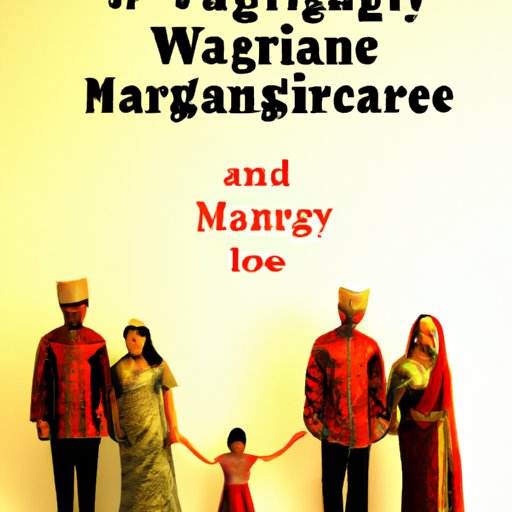Introduction
An arranged marriage is a marriage between two people who are chosen by their parents or other family members. This practice has been common in many cultures throughout history and is still practiced in some parts of the world today. This article will explore the history of arranged marriages in different cultures, examine the role of parents in arranging marriages, and analyze the legal implications of arranged marriages in various countries.

Exploring the History of Arranged Marriages in Different Cultures
Arranged marriages have ancient origins, dating back to the earliest civilizations. In ancient Rome, for example, marriages were often arranged for political or economic reasons. In India, arranged marriages have long been part of the culture, and many families continue to practice them today. Arranged marriages are also found in some Middle Eastern and African cultures, as well as in some Asian countries such as China and Japan.
In many cultures, arranged marriages are seen as a way to strengthen family ties and maintain social status. They are also seen as a way to ensure that the couple is compatible, since they are chosen by family members who know them well. Arranged marriages can also be seen as a way to protect the bride, since her family is involved in the selection process and can ensure that she is being treated fairly.
A Comparison of Arranged Marriages Across Cultures
Although arranged marriages are practiced in many cultures, there are some differences in how they are conducted. In some cultures, the couple may meet before the marriage is finalized, while in others they may not meet until the wedding day. In some cultures, the couple’s families may negotiate a dowry or other arrangements before the marriage takes place. The age at which couples are married may also vary from culture to culture.
In some cultures, arranged marriages are more common than in others. For example, in India and other parts of South Asia, arranged marriages are quite common. In other regions, such as Europe and North America, arranged marriages are much less common but still practiced in some communities.

Examining the Role of Parents in Arranged Marriages Around the World
In most cultures where arranged marriages are practiced, parents play an important role in the selection process. Parents may select potential partners for their children based on a variety of factors, including caste, religion, wealth, and education. In some cultures, parents may even arrange meetings with potential partners before a final decision is made.
Parents also play an important role in setting expectations for the couple. In some cultures, there may be certain expectations about the roles each partner will play in the marriage. For example, in some cultures, the husband may be expected to provide for the family financially, while the wife may be expected to take care of the household and children.
Investigating the Benefits and Challenges of Arranged Marriages in Different Cultures
Arranged marriages can have both advantages and disadvantages. On the one hand, arranged marriages can provide stability and security for the couple, since they are chosen by their families. The couple may also benefit from the support of their families and the extended network of relatives that comes with an arranged marriage.
On the other hand, arranged marriages can also be challenging. The couple may feel pressure to conform to their families’ expectations and may struggle to adjust to their new life together. They may also find it difficult to develop a strong emotional bond if they did not have the opportunity to get to know each other before the marriage.

Analyzing the Legal Implications of Arranged Marriages in Various Countries
The legal requirements for arranged marriages vary from country to country. In some countries, arranged marriages are legally recognized, while in others they are not. In many countries, there are laws in place to protect the rights of both parties in an arranged marriage. These laws may include minimum age requirements, limits on dowries, and other restrictions.
The legal implications of arranged marriages can also vary depending on the region. In some countries, arranged marriages may be seen as a violation of human rights, while in others they may be seen as a traditional practice to be respected. It is important to consider the local laws and customs when examining the legal implications of arranged marriages in any given country.
Conclusion
This article has explored the history, cultural significance, regional variations, parental involvement, advantages and disadvantages, and legal implications of arranged marriages around the world. Arranged marriages are still practiced in many cultures, and they can provide stability and security for the couple. However, they can also be challenging, and it is important to consider the local laws and customs when examining the legal implications of arranged marriages in any given country.
(Note: Is this article not meeting your expectations? Do you have knowledge or insights to share? Unlock new opportunities and expand your reach by joining our authors team. Click Registration to join us and share your expertise with our readers.)
